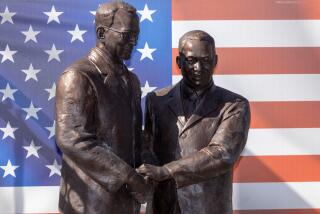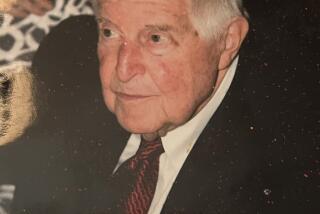Leon Kaplan; Spokesman for Senior Citizens’ Rights, Issues
- Share via
Leon Kaplan, who succeeded at three careers--machinist, manufacturer and advocate for the elderly--has died at age 87.
Kaplan, who had lived for the past decade in Leisure World in Camarillo, died Oct. 19 at Kaiser Hospital in Woodland Hills after a brief illness, said his daughter, Anna Kaplan. He had been using a wheelchair because of a back ailment.
A nationally recognized spokesman for senior citizens and an expert on Social Security and Medicare, Kaplan was appointed to the White House Conference on Aging in 1995. Long active in supporting Democratic candidates for public office, Kaplan favored Vice President Al Gore’s proposal to help pay for seniors’ prescription drugs.
Kaplan, a Los Angeles resident for 35 years before he moved to Camarillo, was founding president of the Westside chapter of the National Council of Senior Citizens, chairman of both Los Angeles’ and California’s Save Our Social Security Committees in the early 1980s and chairman of the Los Angeles Congress of California Seniors.
He served on the California Commission on Aging from 1990 to 1997.
After leading efforts to protest Social Security cuts in 1984, Kaplan helped organize and became executive secretary of the Seniors Coalition Political Action Committee. The group encouraged seniors to become delegates to the national presidential nominating conventions and become more active in the political process.
“We seniors have many, many questions,” he told the group meeting in Los Angeles. “But . . . we do not view our role as seniors from a narrow vantage point. We are Americans. We are not narrow, stupid old people who are worried about the next Social Security check. We are talking as older Americans, and we are thinking of our children and our grandchildren as well . . . “
In speeches and articles, including Op-Ed pieces for The Times, Kaplan protested various proposals to cut Social Security and Medicare, and efforts to privatize the programs.
“With all its defects,” Kaplan told The Times in 1981, “Social Security is a monument to American life. It has kept seniors off the backs of their children.
“We may vary on the nature of the problem in financing Social Security and the ways to solve it,” he said, “but we are united on saving it. We want to use our forum to say to our congressmen, ‘Keep your cotton-picking hands off Social Security.’ ”
Kaplan was also consulted on more controversial issues confronting seniors, such as assisted suicide. Allowing a senior to hasten death, Kaplan told The Times in 1996, could in some circumstances ease pain and provide dignity.
“I think the intelligent view of any senior,” he said, “would be, ‘Look, I’ve served my time, I have done my thing on Earth and I want to go out with honor; I don’t want to end up being a vegetable.’ Who wants to end up doing nothing, vegetating and costing a lot of money to your children?”
Born in New York City, Kaplan attended Brooklyn College for two years until financial problems forced him to quit during the Depression. He moved to San Francisco, where he worked as a machinist, became active in labor unions and married social worker Celeste Strack, who died two years ago.
After the couple moved to Los Angeles in 1955, Kaplan went into business manufacturing machinery for the burgeoning plastics industry.
When he retired in the 1970s, Kaplan went back to school and completed his college degree--in music as a violinist--at Immaculate Heart College.
He is survived by his daughter, of Oak Park, Calif., and one grandson.
No services are planned.
More to Read
Sign up for Essential California
The most important California stories and recommendations in your inbox every morning.
You may occasionally receive promotional content from the Los Angeles Times.












